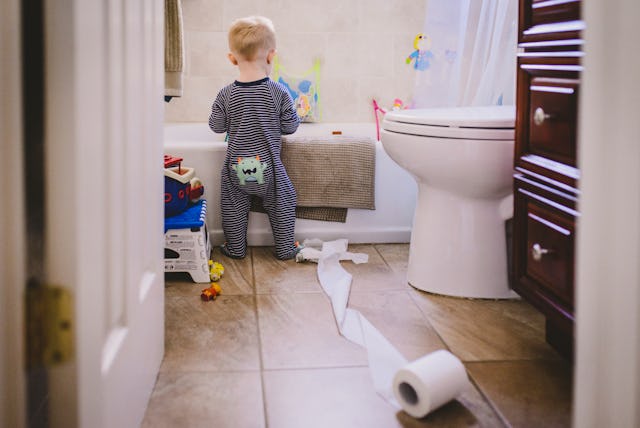Not Sure How To “Discipline” A 1-Year-Old? Meet Your New Best Friend, Redirection
Expert Ashley Blankenship comes in clutch with pointers.

Every parent has been there. Your 1-year-old is pulling at the cat's tail again. They're wedging themselves under their crib again. You've asked them to stop. They don't listen. And soon, you find yourself turned all the way up to 11. You might even lose your sh*t. And it sucks when that happens and you become the screaming mom cliche. The mom who accidentally teaches her kid to curse. The always grumpy or in a slump mom. That's not the kind of mom you wanted to be, but figuring out how to discipline a 1-year-old can feel like a puzzle missing half the pieces.
So, here you are, fighting the same battle again, day after day, hour after hour. Anyone who tells you "it gets easier" is lying. Your kid just gets bigger and faster and sassier. How do you protect your toddler from unwanted or unsafe behavior? Do you even scold a kid this young? Should you discipline them? What would a softer, gentler (read: more well-rested) version of you do?
Here's what an expert recommends.
Can a 1-year-old understand discipline?
Ashley Blankenship is a birth and newborn coach, so it's safe to say she knows a thing or two about babies. She says that while they might understand discipline in the moment, it won't have a lasting effect because of their attention spans and memories.
"At 1 year old, most babies can understand the word 'no' and recognize when caregivers are upset," Blankenship explains to Scary Mommy. "The problem is they have very little impulse control, are very curious, and have extremely short attention spans. They also can't remember things you say for very long because they haven't developed the ability to recall events yet. That comes much later, around 4 to 5 years old."
In other words, while instituting some sort of "discipline" for your 1-year-old might make you feel better in that instant, it will probably not prevent future occurrences. Your baby will repeat whatever they're doing wrong. And in the meantime, their inability to meet your expectations and react appropriately to your discipline will only frustrate you and leave things tenser between you and your baby.
Is it OK to scold a 1-year-old?
Blankenship is against this method, too, as are most child experts. While babies may not have great memories, they're much more empathetic than we tend to give them credit for. That means that they'll understand you're upset, and it will upset them. It won't, however, stop them from doing it again.
"It's not fair to scold a 1-year-old," shares Blankenship. "They want to make you happy and don't have the mental capacity to understand why you're angry yet. All they know is they were exploring and having a great time, and you started being loud."
Blankenship warns that another issue might arise when scolding or yelling at your baby, saying, "They may find that reaction from you exciting and try to get it again!"
So, how do you course-correct a 1-year-old who doesn't listen?
Your precious babe is doing something potentially dangerous. Your obvious natural reaction is to yell. "No!" and "Stop!" erupt from our mouths on the reg. The problem? Your 1-year-old isn't stopping — because they don't really understand what that means. How do you get them to avoid risky or unwanted behavior, then?
"At age 1, discipline is more about redirection than getting them to listen," Blankenship says. "Remaining calm and redirecting to more appropriate or safe activities is the most effective way to correct unwanted behaviors. They are very easily distracted at 1 and are interested in anything put in front of them. They'll soon learn what's off-limits if you remain consistent."
Redirection, you say?
While many people might be familiar with the concept of redirection, not everyone knows how to implement it. The idea is simple. If your baby is doing something you don't want them to do, they're directing their attention in an unwanted direction. Your job is to get their attention on something else, i.e., redirect them. This takes a bit of work and a ton of attention on your part, but it's worth it.
"At 1, they're not trying to make you mad; they're just curious," says Blankenship. "If they're engaging in dangerous behavior, find a way to make that behavior safe and redirect. For instance, if they're hitting the dog, give them pots and pans to bang on. If they're putting things in a socket, find a toy or empty tissue box they can put things in, etc."
Any distraction is beneficial in a moment when you need to think fast. However, as Blankenship suggests, finding a redirection related to what your baby is already doing will go a long way in helping satisfy their curiosity about whatever they're doing that's unwanted.
Being a parent is hard. Especially in crisis moments, when your baby is doing something dangerous or something you've tried to redirect them from a million times before. Just remember that even though they're babbling and possibly walking at 1 year old, they're still not capable of substantive higher thought. Nothing they're doing is to hurt or annoy you intentionally.
Sure, you're going to occasionally lose your sh*t anyway — because, again, parenting is hard. But you'll also feel guilty about it afterward. Apologize and try to do better next time. That's the life of a mama.
This article was originally published on